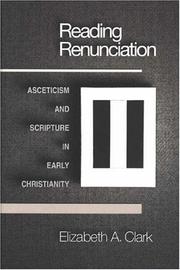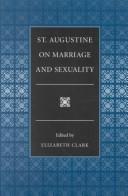| Listing 1 - 10 of 27 | << page >> |
Sort by
|

ISBN: 0691005117 0691005125 1400823188 1282753770 9786612753770 1400811244 9781400823185 1400801230 9780691005126 1400801222 Year: 1999 Publisher: Princeton (N.J.): Princeton university press
Abstract | Keywords | Export | Availability | Bookmark
 Loading...
Loading...Choose an application
- Reference Manager
- EndNote
- RefWorks (Direct export to RefWorks)
A study of how asceticism was promoted through Biblical interpretation, Reading Renunciation uses contemporary literary theory to unravel the writing strategies of the early Christian authors. Not a general discussion of early Christian teachings on celibacy and marriage, the book is a close examination, in the author's words, of how "the Fathers' axiology of abstinence informed their interpretation of Scriptural texts and incited the production of ascetic meaning." Elizabeth Clark begins with a survey of scholarship concerning early Christian asceticism that is designed to orient the nonspecialist. Section Two is organized around potentially troubling issues posed by Old Testament texts that demanded skillful handling by ascetically inclined Christian exegetes. The third section, "Reading Paul," focuses on the hermeneutical problems raised by I Corinthians 7, and the Deutero-Pauline and Pastoral Epistles. Elizabeth Clark's remarkable work will be of interest to scholars of late antiquity, religion, literary theory, and history.
248 "00/04" --- Asceticism --- -Ascetical theology --- Contempt of the world --- Theology, Ascetical --- Christian life --- Ethics --- Spiritualiteit. Ascese. Mystiek. Vroomheid--?"00/04" --- History --- -Asceticism --- Bible --- Criticism, interpretation, etc. --- Biblia --- Asceticism - History - Early church, ca 30-600 --- Acts of Paul and Thecla. --- Acts of Thomas. --- Adultery. --- Allegory. --- Ambrosiaster. --- Anchorite. --- Apologetics. --- Apostasy. --- Arianism. --- Asceticism. --- Basil of Ancyra. --- Basil of Caesarea. --- Bible. --- Body of Christ. --- Book of Judges. --- Book of Wisdom. --- Celibacy. --- Chastity. --- Christian Order. --- Christianity. --- Church Fathers. --- Clement of Alexandria. --- Clerical celibacy. --- Concupiscence. --- Consummation. --- Contra Celsum. --- Conversion to Christianity. --- Criticism of marriage. --- De fide. --- Dialogue with Trypho. --- Dispensation (canon law). --- Docetism. --- Donatism. --- Elijah. --- Epistle to the Ephesians. --- Evagrius Ponticus. --- Exegesis. --- Ezekiel. --- Fear of God. --- First Epistle to the Corinthians. --- Fornication. --- Gluttony. --- God. --- Helvidius. --- Heresy. --- Heterodoxy. --- Holiness code. --- Idolatry. --- Incest. --- Incorruptibility. --- Indulgence. --- Infidel. --- Jews. --- John Cassian. --- John Chrysostom. --- Jovinian. --- Judaizers. --- Justification (theology). --- Justin Martyr. --- Lactantius. --- Manichaeism. --- Marcion of Sinope. --- Marcionism. --- Matthew 25. --- Melania the Elder. --- Midrash. --- Monasticism. --- Montanism. --- New Testament. --- Old Testament. --- Origen. --- Paganism. --- Parable of the Great Banquet. --- Parable of the Ten Virgins. --- Paulinus of Nola. --- Pelagianism. --- Progressive revelation (Bahá'í). --- Rebuke. --- Religion. --- Religious text. --- Renunciation. --- Rule of Faith. --- Sacramentum (oath). --- Self-denial. --- Sexual Desire (book). --- Sexual abstinence. --- Sirach. --- Sola fide. --- Spiritual marriage. --- Spirituality. --- Spouse. --- Superiority (short story). --- Susanna (Book of Daniel). --- Tertullian. --- The City of God (book). --- Theodore of Mopsuestia. --- Theology. --- Thomas the Apostle. --- Thou shalt not commit adultery. --- Virginity.

ISBN: 0674029585 9780674029583 0674015169 9780674015166 0674015843 9780674015845 0674015843 9780674015845 Year: 2022 Publisher: Cambridge, MA
Abstract | Keywords | Export | Availability | Bookmark
 Loading...
Loading...Choose an application
- Reference Manager
- EndNote
- RefWorks (Direct export to RefWorks)
In this work of sweeping erudition, one of our foremost historians of early Christianity considers a variety of theoretical critiques to examine the problems and opportunities posed by the ways in which history is written. Elizabeth Clark argues forcefully for a renewal of the study of premodern Western history through engagement with the kinds of critical methods that have transformed other humanities disciplines in recent decades. History, Theory, Text provides a user-friendly survey of crucial developments in nineteenth- and twentieth-century debates surrounding history, philosophy, and critical theory. Beginning with the "noble dream" of "history as it really was" in the works of Leopold von Ranke, Clark goes on to review Anglo-American philosophies of history, schools of twentieth-century historiography, structuralism, the debate over narrative history, the changing fate of the history of ideas, and the impact of interpretive anthropology and literary theory on current historical scholarship. In a concluding chapter she offers some practical case studies to illustrate how attending to theoretical considerations can illuminate the study of premodernity. Written with energy and clarity, History, Theory, Text is a clarion call to historians for richer and more imaginative use of contemporary theory.
Historiography. --- History --- Christian literature, Early --- History, Modern --- Historical criticism --- Authorship --- Philosophy. --- History and criticism. --- Philosophy --- Criticism --- Historiography

ISBN: 0813210534 9780813210537 0813208661 9780813208664 081320867X 9780813208671 Year: 1996 Publisher: Washington, D.C.
Abstract | Keywords | Export | Availability | Bookmark
 Loading...
Loading...Choose an application
- Reference Manager
- EndNote
- RefWorks (Direct export to RefWorks)
Augustine of Hippo (b. A.D. 354) is considered the single most influential theologian in the history of the Church in the West. Among his many contributions, Augustine developed a sexual ethic that became decisive for all later teachings in the Christian West on issues of marriage, reproduction, and sexuality. Some of the most significant and representative passages on marriage and sexuality from his works are presented here. They recount Augustine's own struggle with sexuality, and stress the important role it played in his conversion to Christianity as well as its influence on his theological principles later in life.The passages in this collection are divided into four chapters which document the chronological development of Augustine's sexual ethic. The first chapter includes passages that pertain to Augustine's own life and illustrate some of his positive and negative models of marital relation. The second chapter recounts Augustine's responses to the Manichean teachings on the body, reproduction, and marriage, mostly from his early years as a Christian. The third chapter contains passages marking Augustine's reaction to the ascetic debates within late fourth-century Latin Christianity. And, finally, the fourth chapter illustrates Augustine's mature sexual and marital ethic, which he elaborated in the midst of?and in reaction to?arguments with Pelagian writers.In a separate introduction, Elizabeth Clark sets the development of Augustine's thought within the context of his own intellectual biography and views it against the background of related issues and movements in the late fourth and early fifth centuries, such as Manichaeism, Jovinianism, and Pelagianism. The selections she presents here offer a comprehensive and uncommonly well-balanced picture of Augustine and his work.St. Augustine on Marriage and Sexuality is the first in a projected series of volumes on various themes found in the writings of the church fathers.ABOUT THE EDITOR:Elizabeth Clark is John Carlisle Kilgo Professor of Religion at Duke University. She is a past president of the American Academy of Religion and the North American Patristic Society, and a member of the editoral board of the Fathers of the Church series.
Marriage --- Sex --- Religious aspects --- Christianity --- Gender (Sex) --- Human beings --- Human sexuality --- Sex (Gender) --- Sexual behavior --- Sexual practices --- Sexuality --- Sexology --- Married life --- Matrimony --- Nuptiality --- Wedlock --- Love --- Sacraments --- Betrothal --- Courtship --- Families --- Home --- Honeymoons --- MARRIAGE --- SEX --- RELIGION --- Religion
Book
ISBN: 9780190888237 0190888237 9780190888220 0190888229 Year: 2021 Publisher: New York : Oxford University Press,
Abstract | Keywords | Export | Availability | Bookmark
 Loading...
Loading...Choose an application
- Reference Manager
- EndNote
- RefWorks (Direct export to RefWorks)
"Melania the Younger: From Rome to Jerusalem analyzes one of the most richly detailed stories of a woman of late antiquity. Melania, an early fifth-century Roman Christian aristocrat, renounced her many possessions and staggering wealth to lead a life of ascetic renunciation. Hers is a tale of "riches to rags." Born to high Roman aristocracy in the late fourth century, Melania encountered numerous difficulties posed by family members, Roman officials, and historical circumstances themselves in disposing of her wealth, property spread across at least eight Roman provinces, and thousands of slaves. Leaving Rome with her entourage a few years before Alaric the Goth's sack of Rome in 410, she journeyed to Sicily, then to North Africa (where she had estates upon which founded monasteries), before settling in Jerusalem. There, after some years of semi-solitary existence, she founded more monastic complexes. Towards the end of her life, she traveled to Constantinople (present-day Istanbul) in an attempt to convert to Christianity her still-pagan uncle, who was on a state mission to the eastern Roman court. Throughout her life, she was accustomed to meet and be assisted by emperors and empresses, bishops, and other high dignitaries. Embracing a fairly extreme asceticism, Melania died in Jerusalem in 439. Her Life, two versions of which (Greek and Latin) were discovered in the late nineteenth- and early twentieth centuries, was composed by a long-time assistant who succeeded her in the direction of the male and female monasteries in Jerusalem. An English translation of the Greek version of her Life accompanies the text of this nine-chapter book"--
Christian women saints --- Christian women saints. --- Homes. --- Saintes chrétiennes --- Melania, --- Homes and haunts. --- Melania, - the Younger, Saint, - 385?-439 --- Melania iunior, matrona Romana
Book
Year: 1983 Publisher: Wilmington Glazier
Abstract | Keywords | Export | Availability | Bookmark
 Loading...
Loading...Choose an application
- Reference Manager
- EndNote
- RefWorks (Direct export to RefWorks)
Book
ISBN: 9780812250718 0812250710 0812295625 Year: 2019 Publisher: Philadelphia University of Pennsylvania Press
Abstract | Keywords | Export | Availability | Bookmark
 Loading...
Loading...Choose an application
- Reference Manager
- EndNote
- RefWorks (Direct export to RefWorks)
In the early twentieth century, a new generation of liberal professors sought to prove Christianity's compatibility with contemporary currents in the study of philosophy, science, history, and democracy. These modernizing professors-Arthur Cushman McGiffert at Union Theological Seminary, George LaPiana at Harvard Divinity School, and Shirley Jackson Case at the University of Chicago Divinity School-hoped to equip their students with a revisionary version of early Christianity that was embedded in its social, historical, and intellectual settings. In The Fathers Refounded, Elizabeth A. Clark provides the first critical analysis of these figures' lives, scholarship, and lasting contributions to the study of Christianity. The Fathers Refounded continues the exploration of Christian intellectual revision begun by Clark in Founding the Fathers: Early Church History and Protestant Professors in Nineteenth-Century America. Drawing on rigorous archival research, Clark takes the reader through the professors' published writings, their institutions, and even their classrooms-where McGiffert tailored nineteenth-century German Protestant theology to his modernist philosophies; where LaPiana, the first Catholic professor at Harvard Divinity School, devised his modernism against the tight constraints of contemporary Catholic theology; and where Case promoted reading Christianity through social-scientific aims and methods. Each, in his own way, extricated his subfield from denominationally and theologically oriented approaches and aligned it with secular historical methodologies.
Book
Year: 1979 Publisher: Lewiston Mellen
Abstract | Keywords | Export | Availability | Bookmark
 Loading...
Loading...Choose an application
- Reference Manager
- EndNote
- RefWorks (Direct export to RefWorks)
Book
Year: 1991 Publisher: S.l. s.n.
Abstract | Keywords | Export | Availability | Bookmark
 Loading...
Loading...Choose an application
- Reference Manager
- EndNote
- RefWorks (Direct export to RefWorks)
Book
Year: 1977 Publisher: Lewiston Mellen
Abstract | Keywords | Export | Availability | Bookmark
 Loading...
Loading...Choose an application
- Reference Manager
- EndNote
- RefWorks (Direct export to RefWorks)
Book
Year: 1983 Publisher: Wilmington Glazier
Abstract | Keywords | Export | Availability | Bookmark
 Loading...
Loading...Choose an application
- Reference Manager
- EndNote
- RefWorks (Direct export to RefWorks)
| Listing 1 - 10 of 27 | << page >> |
Sort by
|

 Search
Search Feedback
Feedback About UniCat
About UniCat  Help
Help News
News